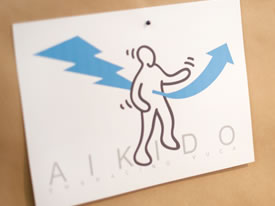 Some time ago, I presented six basic stances for a new kind of sovereignty in organizations on this blog: VUCA-AIKIDO. These stances outline an AIKIDO mindset that can enable employees to face VUCA situations in organizations with greater confidence and to retain their ability to act in the VUCA situations themselves.
Some time ago, I presented six basic stances for a new kind of sovereignty in organizations on this blog: VUCA-AIKIDO. These stances outline an AIKIDO mindset that can enable employees to face VUCA situations in organizations with greater confidence and to retain their ability to act in the VUCA situations themselves.
The basic stances I presented received a positive response. I was encouraged to think further after discussions with clients, project partners and colleagues, not least very intensively at the last Sophia. In the context of organizations, it is especially interesting to think about how managers can apply this AIKIDO mindset in their leadership. How can I lead employees who I have been entrusted with through VUCA situations that have been experienced negatively? How, at the same time, can I enable my team to use the positive potential of VUCA?
I have formulated the following principles to cater to the leadership position. I hope that they contain some initial answers to these questions:
AIKIDO Leadership
AGILISE I promote initiative and intrapreneurship. I provide my team with space and support self-monitoring. I make sure that there will be self-reflection.
USE INTUITION I have an authentic leadership style. I enter dialogues with my employees about their feelings. I deal with mistakes constructively and account for them. I invest in play and experiment.
CREATE CLARITY I tell a good management narrative. I create meaning and give values by guiding action. I curate the topics I deem important.
SPONSOR INTERACTION I trust my employees. I give and ask for open feedback. I make a community out of my employees. I lead together with colleagues and foster co-creation.
BUILD DIVERSITY I seek out »misfit« employees and invest in difference. I encourage my employees to engage in constructive contradiction. I maintain and foster thinking and acting in options.
MAINTAINING ORGANISMS I constantly stimulate change and my actions are guided by the process. I create emergence by networking intensively. I make sure that there is balance and rhythm.
Johannes Ries
